NURSING MISC
Marshalltown Community College
Page 4 out of 45 results
Sort by
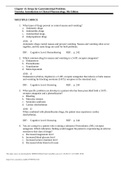
-
NURSING MISCc13.rtf Latest 2022 complete questions & answers explained.
- Exam (elaborations) • 7 pages • 2022
-
- $8.49
- + learn more
Chapter 13: Drugs for Gastrointestinal Problems Vislosky: Introduction to Clinical Pharmacology, 9th Edition MULTIPLE CHOICE 1. What types of drugs prevent or control nausea and vomiting? a. Antiemetic drugs b. Antimotility drugs c. Antidiarrheal drugs d. Ant propulsion drugs ANS: A Antiemetic drugs control nausea and prevent vomiting. Nausea and vomiting often occur together, and the same drugs are used for both problems. DIF: Cognitive Level: Remembering REF: p. 242 2. Which common...
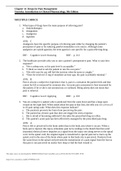
-
Chapter 11: Drugs for Pain Management Visovsky: Introduction to Clinical Pharmacology, 9th Edition
- Case • 6 pages • 2022
-
- $8.49
- + learn more
1. What types of drugs have the main purpose of relieving pain? a. Anticholinergics b. Antagonists c. Analgesics d. Agonists ANS: C Analgesics have the specific purpose of relieving pain either by changing the patient’s perception of pain or by reducing painful stimulation at its source. Although some analgesics are opioid agonists, the term agonist is not specific for a pain-relieving drug. DIF: Cognitive Level: Knowing REF: p. 213 2. The healthcare provider asks you to rate a patie...
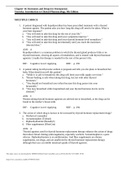
-
Chapter 16: Hormones and Drugs for Osteoporosis Visovsky: Introduction to Clinical Pharmacology, 9th Edition
- Exam (elaborations) • 9 pages • 2022
-
- $8.49
- + learn more
1. A patient diagnosed with hypothyroidism has been prescribed treatment with a thyroid hormone agonist. The patient asks you how long this drug will need to be taken. What is your best response? a. “You will need to take this drug for the rest of your life.” b. “You will need to take this drug until your symptoms improve.” c. “You will need to take this drug until your thyroid hormone level normalizes.” d. “You will need to take this drug incrementally until you reach the ma...
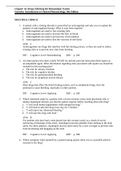
-
Chapter 14: Drugs Affecting the Hematologic System Visovsky: Introduction to Clinical Pharmacology, 9th Edition
- Exam (elaborations) • 10 pages • 2022
-
- $8.49
- + learn more
1. A patient with a clotting disorder is prescribed an anticoagulant and asks you to explain the purpose of anticoagulant therapy. What is your best response? a. Anticoagulants are used to lyse existing clots. b. Anticoagulants are used to increase the flow of blood. c. Anticoagulants are used to prevent new clot formation. d. Anticoagulants are used to thin the viscosity of the blood. ANS: C Anticoagulants are drugs that interfere with the clotting process, so they are used to reduce ex...
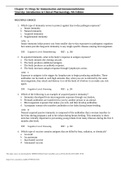
-
Chapter 15: Drugs for Immunization and ImmunomodulationVisovsky: Introduction to Clinical Pharmacology, 9th Edition
- Exam (elaborations) • 6 pages • 2022
-
- $8.49
- + learn more
1. Which type of immunity serves to protect against day-to-day pathogen exposure? a. Innate immunity b. Natural immunity c. Acquired immunity d. Supplemental immunity ANS: A Innate immunity helps protect you from smaller day-to-day exposures to pathogenic organism but cannot provide long-term immunity to any single specific disease-causing microorganism. DIF: Cognitive Level: Remembering REF: p. 280 2. In acquired immunity, what is the body’s response to antigen exposure? a. The body...
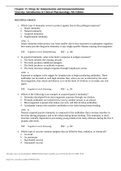
-
Chapter 15: Drugs for Immunization and Immunomodulation Visovsky: Introduction to Clinical Pharmacology, 9th Edition
- Exam (elaborations) • 6 pages • 2022
-
- $8.49
- + learn more
1. Which type of immunity serves to protect against day-to-day pathogen exposure? a. Innate immunity b. Natural immunity c. Acquired immunity d. Supplemental immunity ANS: A Innate immunity helps protect you from smaller day-to-day exposures to pathogenic organism but cannot provide long-term immunity to any single specific disease-causing microorganism. DIF: Cognitive Level: Remembering REF: p. 280 2. In acquired immunity, what is the body’s response to antigen exposure? a. The body...
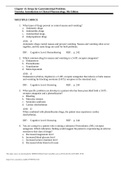
-
Chapter 13: Drugs for Gastrointestinal ProblemsVisovsky: Introduction to Clinical Pharmacology, 9th Edition
- Case • 7 pages • 2022
-
- $8.49
- + learn more
Chapter 13: Drugs for Gastrointestinal Problems Visovsky: Introduction to Clinical Pharmacology, 9th Edition MULTIPLE CHOICE 1. What types of drugs prevent or control nausea and vomiting? a. Antiemetic drugs b. Antimotility drugs c. Antidiarrheal drugs d. Antipropulsion drugs ANS: A Antiemetic drugs control nausea and prevent vomiting. Nausea and vomiting often occur together, and the same drugs are used for both problems. DIF: Cognitive Level: Remembering REF: p. 242 2. Which common...
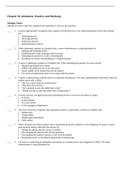
-
NURSING PNN101>Chapter 20. Admission, Transfer, and Discharge
- Exam (elaborations) • 21 pages • 2022
-
- $8.49
- + learn more
Chapter 20. Admission, Transfer, and Discharge Multiple Choice Identify the choice that best completes the statement or answers the question. ____ 1. A nurse appropriately recognizes that a patient will develop his or her initial impression of the nurse during the 1. Teaching process. 2. Discharge process. 3. Admission process. 4. Implementation process. ____ 2. When admitting a patient to a hospital unit, a nurse demonstrates a caring demeanor by 1. Smiling and speaking kindly. 2. Ex...
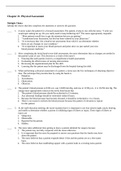
-
NURSING PNN101>Chapter 21. Physical Assessment question and answers
- Exam (elaborations) • 30 pages • 2022
-
- $8.49
- + learn more
Chapter 21. Physical Assessment Multiple Choice Identify the choice that best completes the statement or answers the question. ____ 1. A nurse wakes the patient for a focused assessment. The patient, trying to rest, tells the nurse, “I wish you would quit waking me up. Do you really need to keep bothering me?” The nurse appropriately responds: 1. “Most patients would love to get the attention that you are getting.” 2. “I understand your frustration, but this has been ordered by y...
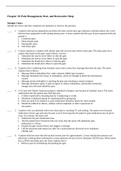
-
Chapter 19. Pain Management, Rest, and Restorative Sleep
- Exam (elaborations) • 15 pages • 2022
-
- $8.49
- + learn more
Multiple Choice Identify the choice that best completes the statement or answers the question. ____ 1. A patient who had an amputation just below the knee several days ago expresses confusion about why a foot that has been amputated is still causing intense pain. A nurse explains that the type of pain experienced by the patient is 1. Cutaneous pain. 2. Deep somatic pain. 3. Neuropathic pain. 4. Soft-tissue pain. ____ 2. A nurse explains to a patient with chronic pain that exercise may r...

How much did you already spend on Stuvia? Imagine there are plenty more of you out there paying for study notes, but this time YOU are the seller. Ka-ching! Discover all about earning on Stuvia


